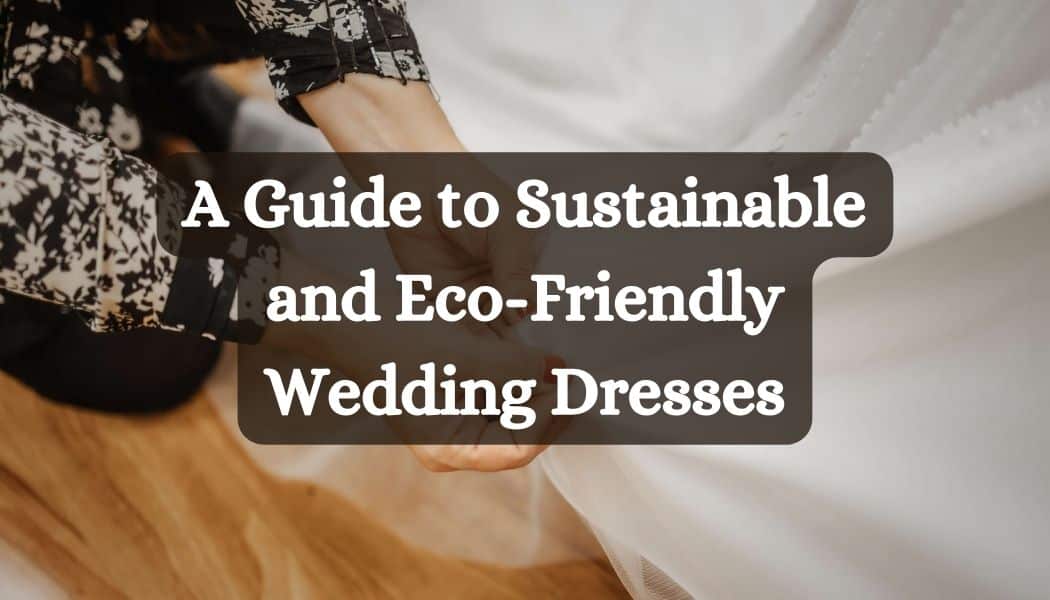
Table of Contents
Key Takeaways
- Eco-Conscious Trend: Increasing popularity of sustainable lifestyle choices, including eco-friendly wedding dresses.
- Environmental Impact: Sustainable dresses use organic, recycled materials to reduce pollution and waste.
- Ethical Fashion: Emphasis on ethical labor practices and supporting artisans.
- Fabric Choices: Options like organic cotton, silk, and hemp offer lower environmental footprints.
- Celebrity Influence: Public figures endorsing sustainable fashion increase consumer awareness and demand.
- Post-Ceremony Sustainability: Selling, donating, or repurposing dresses extends their ethical and environmental benefits.
- Style and Sustainability: A wide variety of designs ensures style doesn’t compromise sustainability.
- Cultural Shift: Movement towards more responsible, sustainable fashion in wedding industry.
Choosing a sustainable wedding dress can be a fashion statement; however, it can be so much more. It can be a commitment to the environment, ethical labour practices, and a sustainable future. This blog post will explore sustainable wedding trends and relevance, as well as five exceptional brands leading the way in sustainable wedding fashion,
Changing Societal Habits to Increase Sustainable Weddings
A noticeable shift towards more eco-conscious lifestyle choices has occurred in the last couple of years. This trend has permeated every industry, and weddings are no exception. Couples are now opting for more sustainable options, from choosing locally sourced food for their reception to sending digital invitations to reduce paper waste, as this trend influences the wedding and fashion industry through wedding attire. Brides, particularly, are leading this charge by seeking sustainable wedding dress brands. This growing inclination towards eco-friendly bridal wear underscores a profound awareness of their choices’ environmental and social impact. Sustainable wedding dress brands champion ethical and eco-conscious practices. They prioritize using organic fabrics, recycled materials, and sustainable production methods, avoiding the environmental toll often associated with traditional wedding dress production. These eco-friendly gowns represent more than just exquisite attire; they embody a commitment to reducing environmental harm and supporting ethical fashion.
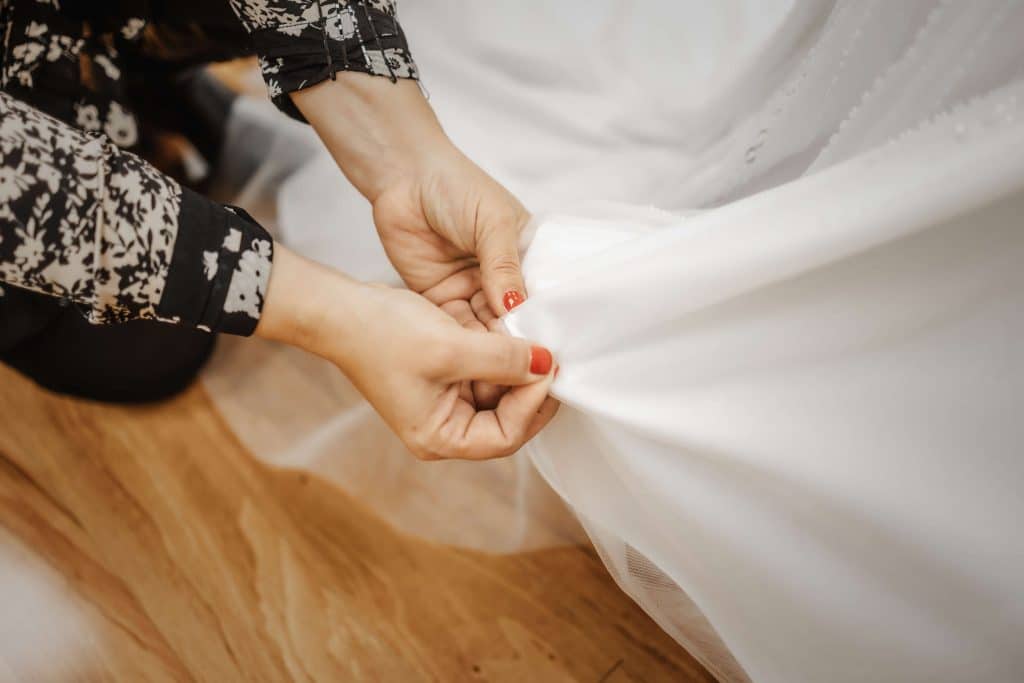
Celebrity Endorsements on Sustainable Fashion Trends
When a celebrity like Meghan Markle or Emma Watson, who wore a Calvin Klein dress made from recycled plastic bottles to the Met Gala, showcases a sustainable fashion choice, it reverberates through the industry. Designers take note, production methods are questioned, and consumers begin to shift their buying habits. The ‘Meghan effect’ led to a surge in demand for sustainable wedding dresses, proving that when celebrities endorse eco-friendly fashion, people listen – and shop accordingly.
Why Choosing a Sustainable Wedding Dress Matters
When planning a wedding, every decision matters. Choosing a wedding dress carries weight, especially since it’s typically only worn once. Traditional wedding dress manufacturing processes often involve harmful chemicals and unethical labour practices and contribute to pollution. By choosing a sustainable wedding dress, brides contribute to a broader movement towards a healthier planet. It’s not just about feeling beautiful on the big day but actively participating in a shift towards a more sustainable and responsible fashion industry. It’s a celebration of love and values—a choice that echoes long after the vows, impacting the environment and supporting ethical fashion practices. Ultimately, it’s a beautiful, conscious step towards a more beautiful, conscious world—a win-win situation where elegance meets environmental responsibility.
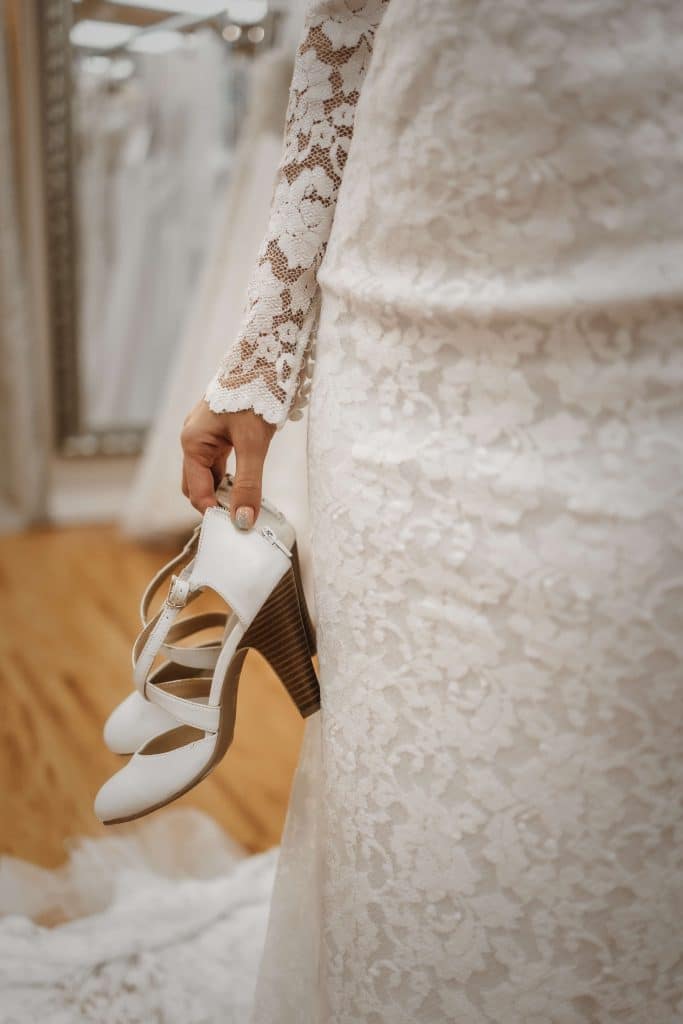
Sustainable Fabric Types
Fabric types play a significant role in its environmental impact. Polyester and nylon, which wedding dresses are traditionally made from, are petroleum-based and require large amounts of energy and water to produce. However, sustainable fabrics such as organic cotton, silk, and hemp have lower environmental impacts. Organic cotton relies on natural fertilizers and avoids harmful pesticides, conserving water and reducing soil degradation. Silk, derived from silkworms, embodies a biodegradable and renewable fabric choice. Production involves significantly lower energy consumption and fewer chemicals than synthetic alternatives. Hemp is durable and sustainable, requiring minimal water to proliferate without pesticides and herbicides. By choosing a dress made from sustainable fabrics, brides can significantly reduce the environmental footprint of their wedding attire.
The Impact of Eco-Friendly Materials
Eco-friendly materials help the fashion industry become more sustainable and ethical. As these materials require less water in manufacturing, they pollute the environment less. Fashion brands actively reduce the extraction of natural resources, alleviating pressure on water reserves and reducing the carbon footprint associated with production by choosing eco-friendly fabrics. Moreover, recycled fabrics provide materials with a second chance at life that might otherwise end up in landfills, supporting a circular economy that uses repurposed and reused resources.
This strategy promotes sustainability by reducing the amount of textile waste that accumulates—a significant environmental issue in the fashion industry. Eco-friendly materials put the welfare of the world and the people who produce them above their ecological impact. Without using chemicals and pesticides to grow organic materials, the environment, farmers, and labourers benefit. Communities and working conditions will benefit from the switch to safer, chemical-free production techniques. Choosing an eco-friendly dress will lead to a step toward a more sustainable society.
Ethical Implications of Eco-Friendly Fashion Choices
Sustainability extends beyond the environment, touching the lives of those who craft our garments. Fast fashion, which includes some traditional wedding attire, often relies on labour practices that raise serious ethical questions. Supporting sustainable wedding dress brands highlights the importance of fair wages, safe working conditions, and transparent supply chains. When a bride selects a dress from a designer committed to eco-friendly practices, she votes for a kinder fashion industry and invests in the well-being of artisans worldwide.
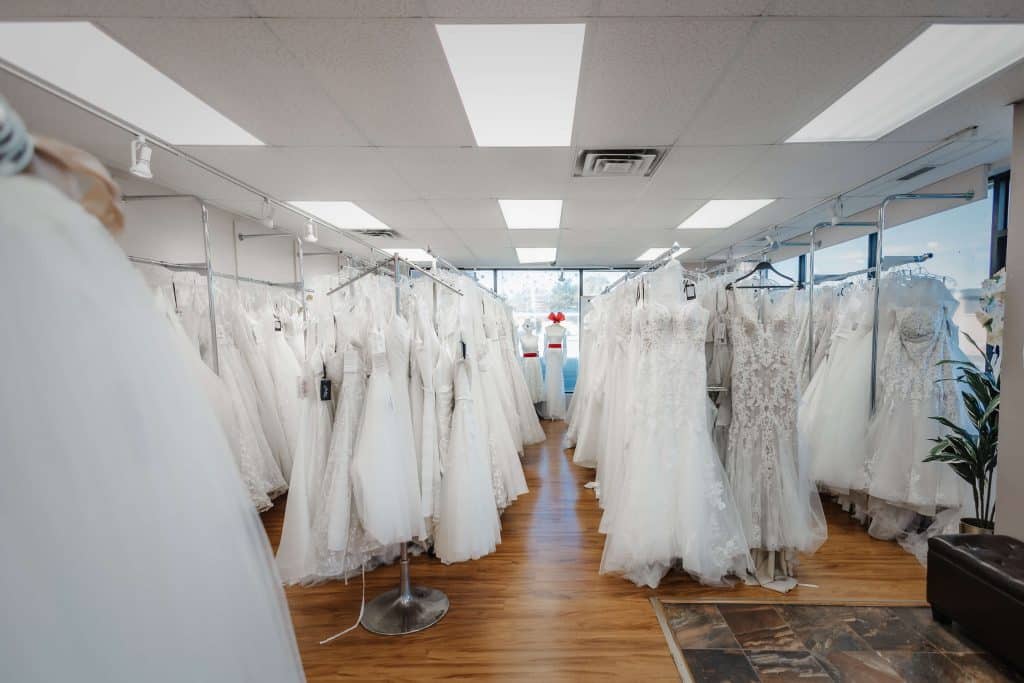
Sustainable Wedding Dress Options
In the quest for eco-conscious living, brides-to-be focus on sustainable wedding attire options. But what exactly does this entail?
Eco-friendly Alternatives
Renting a wedding gown is an alternative, offering the opportunity to don a dream dress without the long-term commitment or price tag. This choice not only alleviates the issue of single-use garments but also reduces waste and resource consumption. Meanwhile, vintage dresses carry a sense of history and uniqueness, each telling its own story. They allow brides to step out in timeless styles, often at a fraction of the cost. Then there are second-hand purchases, which give dresses a new lease on life, affirming the adage that true beauty doesn’t diminish over time. These options lessen the demand for new materials and challenge the ‘wear once’ culture prevalent in wedding fashion.
Pros and Cons
While these sustainable choices have significant environmental benefits, they may pose challenges. Renting a dress might limit modification options, making it difficult for brides seeking a perfect fit or a customized look. Vintage and second-hand dresses require thorough searching to find the right style and size, which can be time-consuming. There may also be additional costs for cleaning or restorations. Despite these hurdles, the rewards of contributing to a greener world and potentially uncovering a one-of-a-kind gown often outweigh any drawbacks.
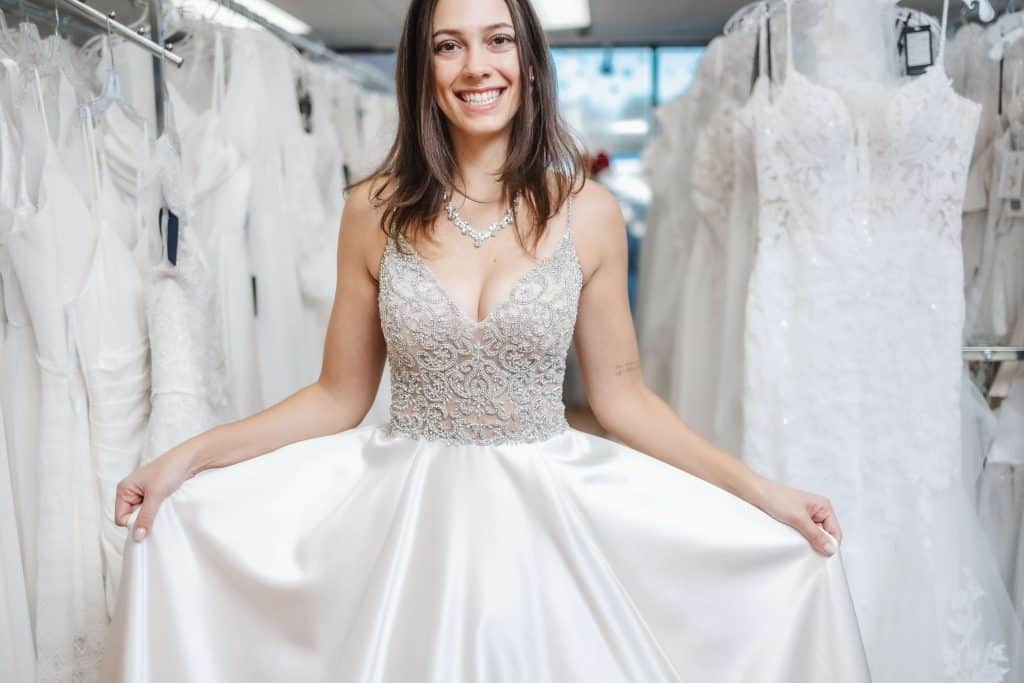
The Beauty of Choice and Creativity
The journey towards sustainability doesn’t mean sacrificing personal taste or unique bridal visions. On the contrary, it opens up a world of diversity and creativity. From boho chic to classic elegance, the range of sustainable wedding dresses is as varied as the brides. Designers are also rising to the occasion, crafting gowns from eco-friendly materials like organic cotton, peace silk, or recycled fabrics, ensuring that sustainability can be beautiful and accessible.
Post-Ceremony Considerations
After the confetti settles and the last dance winds down, a bride’s wedding dress symbolizes her special day. Yet, what becomes of this cherished gown in the grand tapestry of sustainability? We explore post-ceremony strategies that can extend the ethical lifecycle of a wedding dress, ensuring that the joy it brings doesn’t come with an environmental cost.
Selling or Repurposing Your Wedding Dress
The idea of parting with your wedding dress might bring a sentimental pause; however, selling your gown is a profound step towards sustainable living. Platforms dedicated to second-hand wedding attire are trendsetters and hubs for ethical brides to pass on their cherished gowns. The reuse cycle not only lessens the demand for new fabrics but also offers another bride the chance to experience the magic of a gown that comes with its own story. Alternatively, repurposing transforms the dress into new garments or keepsakes. Some brides choose to have it tailored into cocktail dresses or even christening gowns, giving the fabric a second life in a new form.
The Ripple Effect of Ethical Wedding Dress Decisions
The journey of a wedding dress can significantly influence sustainability and ethical practices within the fashion industry. When a bride chooses to sell, donate, or repurpose her gown, she creates a ripple effect. This single decision reduces waste, diminishes the need for resource-intensive production of new dresses, and establishes a conscientious narrative around weddings. By taking these actions, brides contribute to a culture of mindful consumption and responsible stewardship of resources.
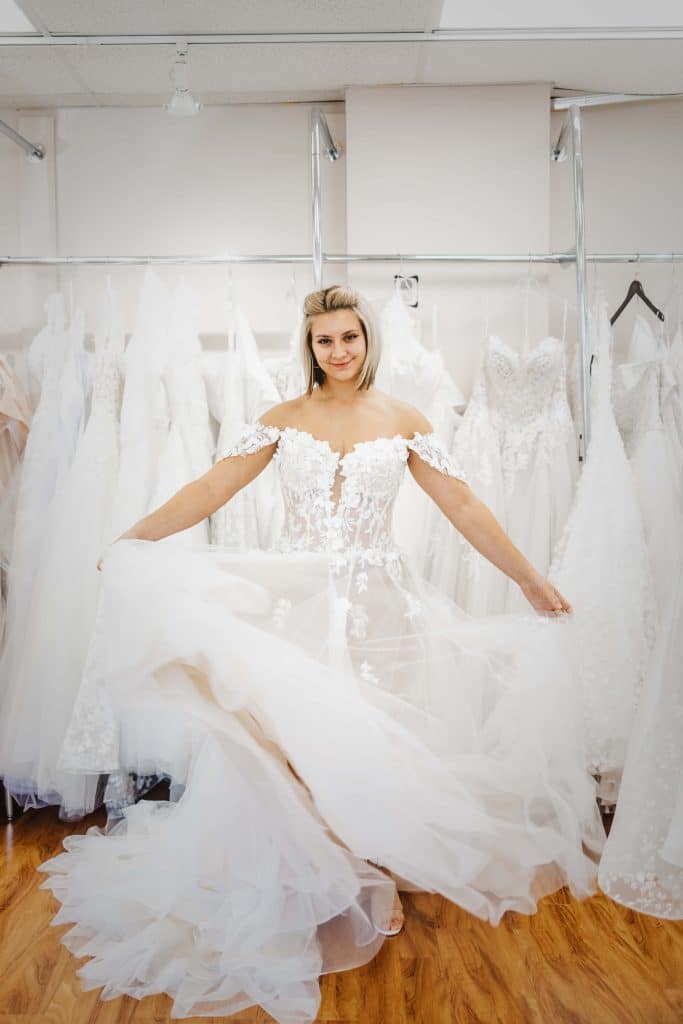
Reflecting on the Life Cycle of a Wedding Dress
As ethical brides, reflecting on the complete life cycle of a wedding dress is essential. The dress’s journey doesn’t end at “I do.” Consideration of its post-ceremony destiny is a testament to responsible consumerism. Whether it’s becoming a family heirloom, being donated to a charitable organization, or being transformed into a piece of art, each choice embodies a commitment to sustainability. Brides are encouraged to envision the future of their dress as an extension of their values and an opportunity to make a lasting, positive impact on the environment.
Conclusion
Selecting a sustainable wedding dress isn’t merely about fashion; it’s a transformative choice that amplifies the significance of your special day—a reflection of your dedication to preserving our planet and shaping a more sustainable future. The presence of pioneering brands such as PureMagnolia, Wear Your Love, Anita Dongre, Grace Loves Lace, and Reformation marks a pivotal moment in the bridal industry, where style converges with sustainability seamlessly.
By opting for a sustainable wedding dress from these trailblazing labels, you’re not just making a fashion statement but a profound commitment. In a world where every decision holds weight, choosing sustainable fashion for your wedding day becomes a celebration of values—a testament to responsible consumption and a gesture towards a more sustainable planet. Your wedding day becomes a canvas where love, style, and conscientious choices intertwine harmoniously. By embracing sustainable fashion on this momentous occasion, you’re weaving a narrative that celebrates love for each other and the planet. Make your wedding day unforgettable by embracing sustainable fashion and choosing to celebrate love, not just for each other but for our environment.
FAQ: Sustainable and Eco-Friendly Wedding Dresses
What are the benefits of choosing a sustainable wedding dress?
Sustainable wedding dresses offer several benefits. They minimize environmental impact by using organic, recycled materials and sustainable production methods. This choice supports ethical labor practices and reduces pollution and waste associated with traditional wedding dress manufacturing. Additionally, it represents a commitment to environmental conservation and ethical fashion.
How have societal trends influenced the popularity of sustainable wedding dresses?
In recent years, there has been a noticeable shift towards eco-conscious lifestyle choices, influencing various industries, including weddings. Couples are increasingly seeking sustainable options, such as locally sourced food and digital invitations, to minimize environmental impact. This trend is evident in the growing demand for sustainable wedding dresses, driven by an awareness of the environmental and social implications of fashion choices.
What are some eco-friendly fabric options for sustainable wedding dresses?
Eco-friendly fabric options for sustainable wedding dresses include organic cotton, silk, and hemp. Organic cotton uses natural fertilizers and avoids harmful pesticides, reducing water usage and soil degradation. Silk is a biodegradable and renewable fabric with lower energy consumption and fewer chemicals. Hemp is durable and grows with minimal water and without pesticides or herbicides, making it a highly sustainable choice.
What are the ethical implications of choosing eco-friendly wedding attire?
Choosing eco-friendly wedding attire has significant ethical implications. It promotes fair wages, safe working conditions, and transparent supply chains in the fashion industry. By selecting sustainable brands, brides support a kinder fashion industry and contribute to the well-being of artisans worldwide. It’s a choice that reflects a commitment to ethical consumerism and responsible fashion.











